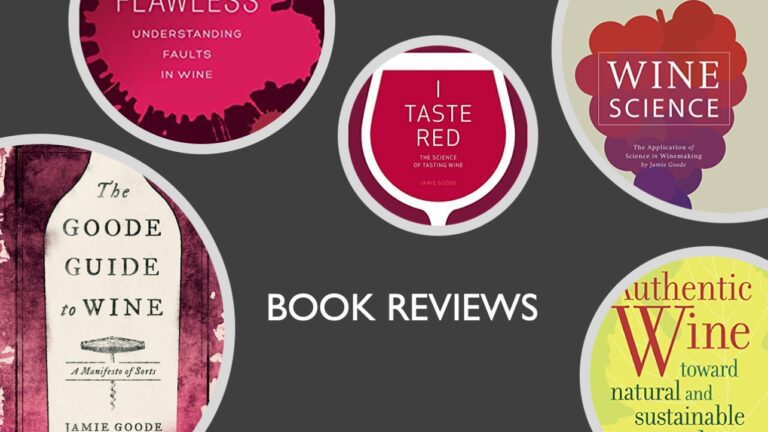As a book author, I get my work appraised by others in public. Book reviews are part of the territory, and in the past I’ve devoured them. Recently, I received some good advice in a Twitter DM after I’d posted a frankly shocking review of my latest book.
Stop. Reading. Your. Reviews. It will not help you. The bad ones will seem worse, the good ones will never compensate. The ones from wine professionals will seem like betrayals. Trust yourself and the quality of your craftsmanship.
There’s a lot of wisdom here.
It’s really hard to take feedback, even though it can be very useful. Compliments and praise tend to wash over us – they feel delicious, but they are fleeting, finding no place to lodge. Negative comments, however, always seem to find some purchase, and they hang around for a while, and we find it very hard to let them go.
In the wine world, the strange thing is that your books are mostly reviewed by your peers. Suddenly people you know – professionally, and in many cases also socially – are evaluating your work in public. The tables are turned often: I get sent books by my colleagues for review on a regular basis.
You can learn a lot from honest, competent feedback. The thing that is hard to deal with, though, is when you feel that some of the comments weren’t made entirely in good faith. When they seem a bit mean, and even personal.
Then there’s the good old ‘shit sandwich’ review. For one reason or another, a reviewer wants to bash your book, but finds it hard simply to pen a negative review. They feel the way to justify the shit is to sandwich it neatly between two thick (and insincere) slices of praise. There’s also the give-and-take away sort of review, where someone feels that if they say something positive, they have to find a problem to counter it, for the sake of balance.
Professional jealousy is real. And it’s really hard to hide in the context of reviewing one of your colleagues’ books. It is a corrosive thread that shows up clearly in a review, even when the reviewer has been at pains to hide it, and justifies their bitter work in the name of thoroughness. When you first start out, you don’t experience professional jealousy from others: even those who have a stronger case of this than others are nice and supportive at first because you aren’t a threat. Achieve modest success and there will be people who feel that you have taken the gigs they should have had, and who are convinced they are better than you and that they are being unfairly overlooked, or who are insecure because their career has plateaued or is in decline. And your book may have been sent to them for review.
I have written a range of books, now. They’ve been really well received, some have won awards, others have been shortlisted for awards, and I’m happy with all of them. With my latest book I took a risk, though. It’s deliberately provocative. It’s opinionated. It is quite personal. And when I was writing it, I wasn’t sure it would ever be published. My expectation was that some people would love it, and some would hate it. And it’s no surprise that while most reviews are positive, there have been some rather mean ones. It’s a smart book for smart people – thinkers. It’s not for everyone.
This is where the advice above comes in useful.
How should we deal with criticism? Even where the criticism is mean, there is often something to be learned. The first thing is to never complain and never explain: Disraeli was right. Then, try to step back and see, whether in the midst of the negative sentiments, there is some truth. There may not be, but considering the possibility is a wise path to take.
My first book, Wine Science, was sent out for academic review by the co-publisher, University of California Press. The UK publisher, Mitchell Beazley, already had the book at proof stage (they had no idea that UC Press got all their books peer reviewed). Much to the alarm of both parties, the two scientists who reviewed the book hated it, and recommended an extensive revision.
They wanted it to be more like an academic book – effectively a textbook. Their guidelines went so far as to even suggest a revised chapter list. The whole project was in jeopardy.
I was called to a meeting with both publishers. Normally, in these situations, you’d revise the book in line with the reviewers’ recommendations. You might not make all their suggested changes, but you’d take on board many of them. I decided I wasn’t going to change anything. This was my book, and I’d deliberately written it to be more a story book packed with examples, exploring the interesting side of wine science, rather than anything looking like a textbook. To make changes would have been to take something away from this vision. It would have diminished the book.
I pled my case well, I think, because the publishers were convinced. The reviewers had got it wrong. They asked me for suggestions of two other scientists who could review the book, and their reports were very positive, and publication went ahead. The book has done really well, and the third edition is soon to appear.
I hope my manifesto will do well. I’m happy with it. It’s not a perfect book, but it’s just right. It is what it is, and I’ll try my best not to read any more reviews of it.
Reminder: this blog is irregularly updated, but there are daily updates on the main wineanorak site.



